
#include <tree.h>


Definition at line 107 of file tree.h.
Public Types | |
| typedef T | value_type |
| Value of the data stored at a node. | |
| typedef pre_order_iterator | iterator |
| The default iterator types throughout the tree class. | |
| typedef breadth_first_queued_iterator | breadth_first_iterator |
Public Member Functions | |
| tree () | |
| tree (const T &) | |
| tree (const iterator_base &) | |
| tree (const tree< T, tree_node_allocator > &) | |
| ~tree () | |
| void | operator= (const tree< T, tree_node_allocator > &) |
| pre_order_iterator | begin () const |
| Return iterator to the beginning of the tree. | |
| pre_order_iterator | end () const |
| Return iterator to the end of the tree. | |
| post_order_iterator | begin_post () const |
| Return post-order iterator to the beginning of the tree. | |
| post_order_iterator | end_post () const |
| Return post-order iterator to the end of the tree. | |
| fixed_depth_iterator | begin_fixed (const iterator_base &, unsigned int) const |
| Return fixed-depth iterator to the first node at a given depth. | |
| fixed_depth_iterator | end_fixed (const iterator_base &, unsigned int) const |
| Return fixed-depth iterator to end of the nodes at given depth. | |
| breadth_first_queued_iterator | begin_breadth_first () const |
| Return breadth-first iterator to the first node at a given depth. | |
| breadth_first_queued_iterator | end_breadth_first () const |
| Return breadth-first iterator to end of the nodes at given depth. | |
| sibling_iterator | begin (const iterator_base &) const |
| Return sibling iterator to the first child of given node. | |
| sibling_iterator | end (const iterator_base &) const |
| Return sibling iterator to the end of the children of a given node. | |
| leaf_iterator | begin_leaf () const |
| Return leaf iterator to the first leaf of the tree. | |
| leaf_iterator | end_leaf () const |
| Return leaf iterator to the last leaf of the tree. | |
| template<typename iter> | |
| iter | previous_sibling (iter) const |
| Return iterator to the previous sibling of a node. | |
| template<typename iter> | |
| iter | next_sibling (iter) const |
| Return iterator to the next sibling of a node. | |
| template<typename iter> | |
| iter | next_at_same_depth (iter) const |
| Return iterator to the next node at a given depth. | |
| void | clear () |
| Erase all nodes of the tree. | |
| template<typename iter> | |
| iter | erase (iter) |
| Erase element at position pointed to by iterator, return incremented iterator. | |
| void | erase_children (const iterator_base &) |
| Erase all children of the node pointed to by iterator. | |
| template<typename iter> | |
| iter | append_child (iter position) |
| Insert empty node as last/first child of node pointed to by position. | |
| template<typename iter> | |
| iter | prepend_child (iter position) |
| template<typename iter> | |
| iter | append_child (iter position, const T &x) |
| Insert node as last/first child of node pointed to by position. | |
| template<typename iter> | |
| iter | prepend_child (iter position, const T &x) |
| template<typename iter> | |
| iter | append_child (iter position, iter other_position) |
| Append the node (plus its children) at other_position as last/first child of position. | |
| template<typename iter> | |
| iter | prepend_child (iter position, iter other_position) |
| template<typename iter> | |
| iter | append_children (iter position, sibling_iterator from, sibling_iterator to) |
| Append the nodes in the from-to range (plus their children) as last/first children of position. | |
| template<typename iter> | |
| iter | prepend_children (iter position, sibling_iterator from, sibling_iterator to) |
| pre_order_iterator | set_head (const T &x) |
| Short-hand to insert topmost node in otherwise empty tree. | |
| template<typename iter> | |
| iter | insert (iter position, const T &x) |
| Insert node as previous sibling of node pointed to by position. | |
| sibling_iterator | insert (sibling_iterator position, const T &x) |
| Specialisation of previous member. | |
| template<typename iter> | |
| iter | insert_subtree (iter position, const iterator_base &subtree) |
| Insert node (with children) pointed to by subtree as previous sibling of node pointed to by position. | |
| template<typename iter> | |
| iter | insert_after (iter position, const T &x) |
| Insert node as next sibling of node pointed to by position. | |
| template<typename iter> | |
| iter | insert_subtree_after (iter position, const iterator_base &subtree) |
| Insert node (with children) pointed to by subtree as next sibling of node pointed to by position. | |
| template<typename iter> | |
| iter | replace (iter position, const T &x) |
| Replace node at 'position' with other node (keeping same children); 'position' becomes invalid. | |
| template<typename iter> | |
| iter | replace (iter position, const iterator_base &from) |
| Replace node at 'position' with subtree starting at 'from' (do not erase subtree at 'from'); see above. | |
| sibling_iterator | replace (sibling_iterator orig_begin, sibling_iterator orig_end, sibling_iterator new_begin, sibling_iterator new_end) |
| Replace string of siblings (plus their children) with copy of a new string (with children); see above. | |
| template<typename iter> | |
| iter | flatten (iter position) |
| Move all children of node at 'position' to be siblings, returns position. | |
| template<typename iter> | |
| iter | reparent (iter position, sibling_iterator begin, sibling_iterator end) |
| Move nodes in range to be children of 'position'. | |
| template<typename iter> | |
| iter | reparent (iter position, iter from) |
| Move all child nodes of 'from' to be children of 'position'. | |
| template<typename iter> | |
| iter | wrap (iter position, const T &x) |
| Replace node with a new node, making the old node a child of the new node. | |
| template<typename iter> | |
| iter | move_after (iter target, iter source) |
| Move 'source' node (plus its children) to become the next sibling of 'target'. | |
| template<typename iter> | |
| iter | move_before (iter target, iter source) |
| Move 'source' node (plus its children) to become the previous sibling of 'target'. | |
| sibling_iterator | move_before (sibling_iterator target, sibling_iterator source) |
| template<typename iter> | |
| iter | move_ontop (iter target, iter source) |
| Move 'source' node (plus its children) to become the node at 'target' (erasing the node at 'target'). | |
| void | merge (sibling_iterator, sibling_iterator, sibling_iterator, sibling_iterator, bool duplicate_leaves=false) |
| Merge with other tree, creating new branches and leaves only if they are not already present. | |
| void | sort (sibling_iterator from, sibling_iterator to, bool deep=false) |
| Sort (std::sort only moves values of nodes, this one moves children as well). | |
| template<class StrictWeakOrdering> | |
| void | sort (sibling_iterator from, sibling_iterator to, StrictWeakOrdering comp, bool deep=false) |
| template<typename iter> | |
| bool | equal (const iter &one, const iter &two, const iter &three) const |
| Compare two ranges of nodes (compares nodes as well as tree structure). | |
| template<typename iter, class BinaryPredicate> | |
| bool | equal (const iter &one, const iter &two, const iter &three, BinaryPredicate) const |
| template<typename iter> | |
| bool | equal_subtree (const iter &one, const iter &two) const |
| template<typename iter, class BinaryPredicate> | |
| bool | equal_subtree (const iter &one, const iter &two, BinaryPredicate) const |
| tree | subtree (sibling_iterator from, sibling_iterator to) const |
| Extract a new tree formed by the range of siblings plus all their children. | |
| void | subtree (tree &, sibling_iterator from, sibling_iterator to) const |
| void | swap (sibling_iterator it) |
| Exchange the node (plus subtree) with its sibling node (do nothing if no sibling present). | |
| void | swap (iterator, iterator) |
| Exchange two nodes (plus subtrees). | |
| int | size () const |
| Count the total number of nodes. | |
| int | size (const iterator_base &) const |
| Count the total number of nodes below the indicated node (plus one). | |
| bool | empty () const |
| Check if tree is empty. | |
| int | depth (const iterator_base &) const |
| Compute the depth to the root. | |
| unsigned int | number_of_siblings (const iterator_base &) const |
| Count the number of 'next' siblings of node at iterator. | |
| bool | is_in_subtree (const iterator_base &position, const iterator_base &begin, const iterator_base &end) const |
| Determine whether node at position is in the subtrees with root in the range. | |
| bool | is_valid (const iterator_base &) const |
| Determine whether the iterator is an 'end' iterator and thus not actually pointing to a node. | |
| unsigned int | index (sibling_iterator it) const |
| Determine the index of a node in the range of siblings to which it belongs. | |
| sibling_iterator | child (const iterator_base &position, unsigned int) const |
| Inverse of 'index': return the n-th child of the node at position. | |
Static Public Member Functions | |
| template<typename iter> | |
| static iter | parent (iter) |
| Return iterator to the parent of a node. | |
| static unsigned int | number_of_children (const iterator_base &) |
| Count the number of children of node at position. | |
Data Fields | |
| tree_node * | head |
| tree_node * | feet |
Protected Types | |
| typedef tree_node_< T > | tree_node |
Private Member Functions | |
| void | head_initialise_ () |
| void | copy_ (const tree< T, tree_node_allocator > &other) |
Private Attributes | |
| tree_node_allocator | alloc_ |
Data Structures | |
| class | breadth_first_queued_iterator |
| Breadth-first iterator, using a queue. More... | |
| class | compare_nodes |
| Comparator class for two nodes of a tree (used for sorting and searching). More... | |
| class | fixed_depth_iterator |
| Iterator which traverses only the nodes at a given depth from the root. More... | |
| class | iterator_base |
| Base class for iterators, only pointers stored, no traversal logic. More... | |
| class | iterator_base_less |
| Comparator class for iterators (compares pointer values; why doesn't this work automatically?). More... | |
| class | leaf_iterator |
| Iterator which traverses only the leaves. More... | |
| class | post_order_iterator |
| Depth-first iterator, first accessing the children, then the node itself. More... | |
| class | pre_order_iterator |
| Depth-first iterator, first accessing the node, then its children. More... | |
| class | sibling_iterator |
| Iterator which traverses only the nodes which are siblings of each other. More... | |
typedef tree_node_<T> tree< T, tree_node_allocator >::tree_node [protected] |
| typedef T tree< T, tree_node_allocator >::value_type |
| typedef pre_order_iterator tree< T, tree_node_allocator >::iterator |
| typedef breadth_first_queued_iterator tree< T, tree_node_allocator >::breadth_first_iterator |
Definition at line 500 of file tree.h.
References tree< T, tree_node_allocator >::head_initialise_().
00501 { 00502 head_initialise_(); 00503 }

| tree< T, tree_node_allocator >::tree | ( | const T & | x | ) | [inline] |
Definition at line 506 of file tree.h.
References tree< T, tree_node_allocator >::head_initialise_(), and tree< T, tree_node_allocator >::set_head().
00507 { 00508 head_initialise_(); 00509 set_head(x); 00510 }

| tree< T, tree_node_allocator >::tree | ( | const iterator_base & | other | ) | [inline] |
Definition at line 513 of file tree.h.
References tree< T, tree_node_allocator >::begin(), tree< T, tree_node_allocator >::head_initialise_(), tree< T, tree_node_allocator >::replace(), and tree< T, tree_node_allocator >::set_head().
00514 { 00515 head_initialise_(); 00516 set_head((*other)); 00517 replace(begin(), other); 00518 }

| tree< T, tree_node_allocator >::tree | ( | const tree< T, tree_node_allocator > & | other | ) | [inline] |
Definition at line 554 of file tree.h.
References tree< T, tree_node_allocator >::copy_(), and tree< T, tree_node_allocator >::head_initialise_().
00555 { 00556 head_initialise_(); 00557 copy_(other); 00558 }

Definition at line 521 of file tree.h.
References tree< T, tree_node_allocator >::alloc_, tree< T, tree_node_allocator >::clear(), tree< T, tree_node_allocator >::feet, and tree< T, tree_node_allocator >::head.

| void tree< T, tree_node_allocator >::operator= | ( | const tree< T, tree_node_allocator > & | other | ) | [inline] |
Definition at line 548 of file tree.h.
References tree< T, tree_node_allocator >::copy_().
00549 { 00550 copy_(other); 00551 }

| tree< T, tree_node_allocator >::pre_order_iterator tree< T, tree_node_allocator >::begin | ( | ) | const [inline] |
Return iterator to the beginning of the tree.
Definition at line 639 of file tree.h.
References tree< T, tree_node_allocator >::head, and tree_node_< T >::next_sibling.
Referenced by addClassCpp(), addFunctionCpp(), applyModification(), classAssignement(), className(), clean_pattern(), tree< T, tree_node_allocator >::copy_(), copy_branch(), tree< T, tree_node_allocator >::empty(), tree< T, tree_node_allocator >::equal_subtree(), exportXML(), Ast::fillAstInformation(), Ast::functionBoxing(), Ast::functionMapping(), functionReturnValue(), getNodeIter(), getNodeValue(), Ast::getSubVariables(), insert_branch(), Ast::nbNestedVariables(), Ast2Php::operator()(), Ast2Cpp::operator()(), ControlFlow::operator()(), RenameVariable::operator()(), RenameFunction::operator()(), RenameClass::operator()(), NumberSunkDiffuseInputs::operator()(), NumberDiffuseInputs::operator()(), NumberInput::operator()(), NumberResources::operator()(), NumberSinks::operator()(), kptree::print_subtree_bracketed(), kptree::print_tree_bracketed(), tree< T, tree_node_allocator >::size(), Ast::skeleton(), tree< T, tree_node_allocator >::sort(), Ast::sourceBoxing(), tree< T, tree_node_allocator >::subtree(), Ast::trace(), tree< T, tree_node_allocator >::tree(), writeCPP(), writeSiblingsCPP(), and writeSiblingsXML().
00640 { 00641 return pre_order_iterator(head->next_sibling); 00642 }
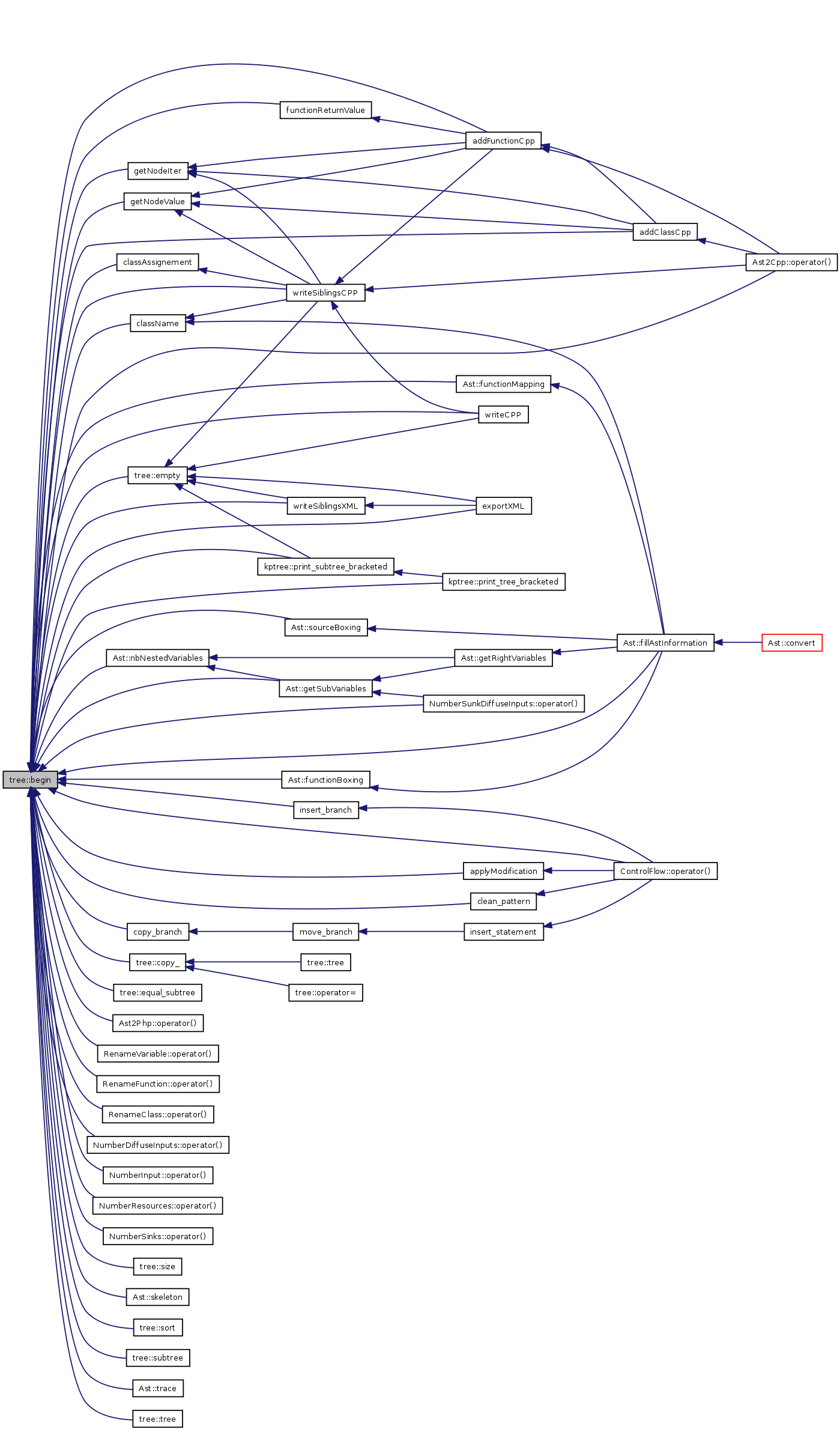
| tree< T, tree_node_allocator >::pre_order_iterator tree< T, tree_node_allocator >::end | ( | ) | const [inline] |
Return iterator to the end of the tree.
Definition at line 645 of file tree.h.
References tree< T, tree_node_allocator >::feet.
Referenced by addClassCpp(), addFunctionCpp(), applyModification(), tree< T, tree_node_allocator >::begin(), classAssignement(), className(), clean_pattern(), tree< T, tree_node_allocator >::copy_(), copy_branch(), tree< T, tree_node_allocator >::empty(), tree< T, tree_node_allocator >::equal_subtree(), exportXML(), Ast::fillAstInformation(), Ast::functionBoxing(), Ast::functionMapping(), functionReturnValue(), Ast::getLeftVariable(), getNodeIter(), getNodeValue(), Ast::getRightVariables(), Ast::getSimpleVariable(), Ast::getSubVariables(), insert_branch(), Ast::nbNestedVariables(), Ast2Php::operator()(), Ast2Cpp::operator()(), ControlFlow::operator()(), RenameVariable::operator()(), RenameFunction::operator()(), RenameClass::operator()(), NumberSunkDiffuseInputs::operator()(), NumberResources::operator()(), NumberSinks::operator()(), kptree::print_subtree_bracketed(), kptree::print_tree_bracketed(), tree< T, tree_node_allocator >::reparent(), tree< T, tree_node_allocator >::size(), Ast::skeleton(), tree< T, tree_node_allocator >::sort(), Ast::sourceBoxing(), tree< T, tree_node_allocator >::subtree(), subVarName(), writeCPP(), writeSiblingsCPP(), and writeSiblingsXML().
00646 { 00647 return pre_order_iterator(feet); 00648 }
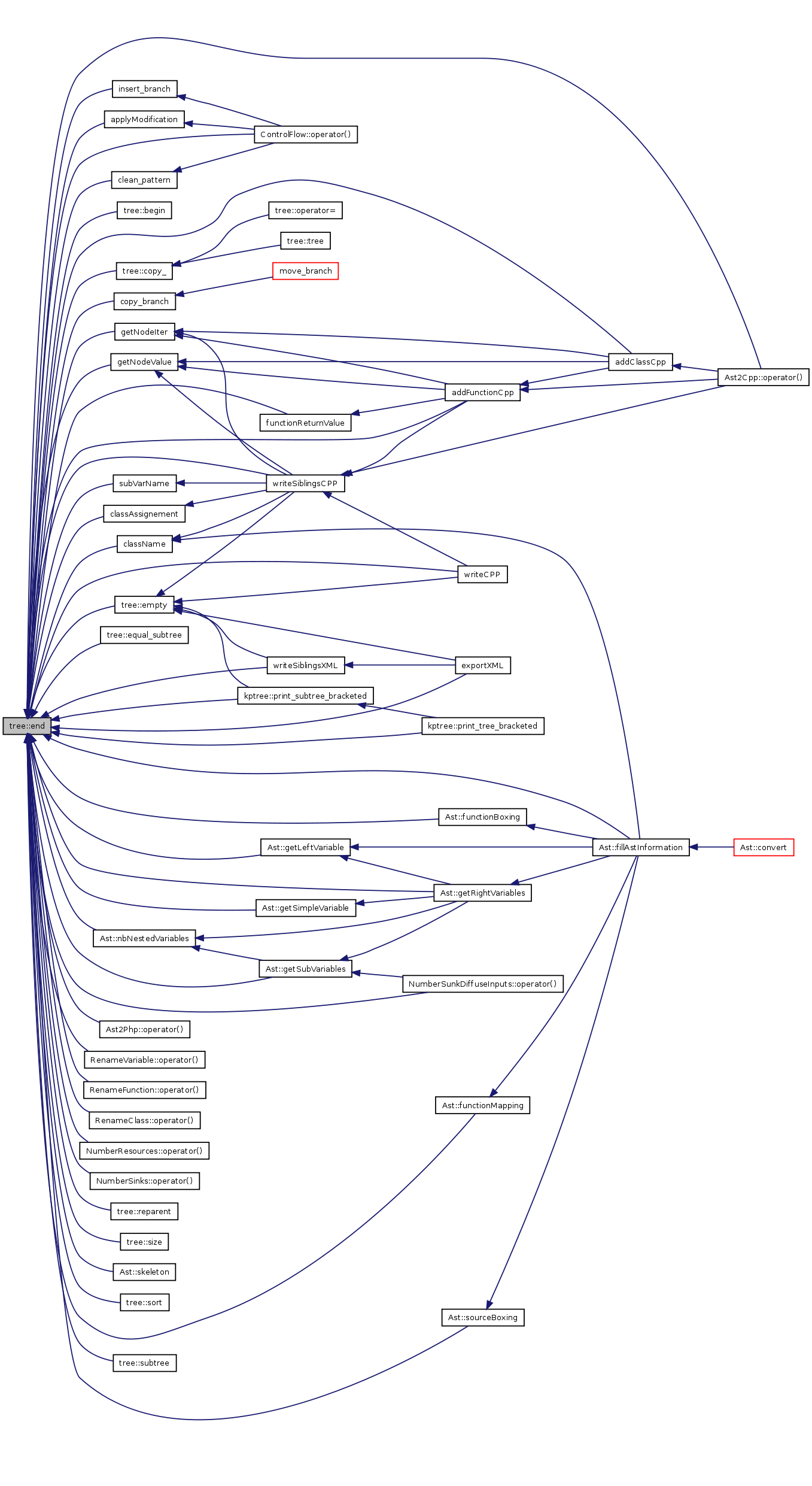
| tree< T, tree_node_allocator >::post_order_iterator tree< T, tree_node_allocator >::begin_post | ( | ) | const [inline] |
Return post-order iterator to the beginning of the tree.
Definition at line 663 of file tree.h.
References tree< T, tree_node_allocator >::feet, tree_node_< T >::first_child, tree< T, tree_node_allocator >::head, and tree_node_< T >::next_sibling.
00664 { 00665 tree_node *tmp=head->next_sibling; 00666 if(tmp!=feet) { 00667 while(tmp->first_child) 00668 tmp=tmp->first_child; 00669 } 00670 return post_order_iterator(tmp); 00671 }
| tree< T, tree_node_allocator >::post_order_iterator tree< T, tree_node_allocator >::end_post | ( | ) | const [inline] |
Return post-order iterator to the end of the tree.
Definition at line 674 of file tree.h.
References tree< T, tree_node_allocator >::feet.
00675 { 00676 return post_order_iterator(feet); 00677 }
| tree< T, tree_node_allocator >::fixed_depth_iterator tree< T, tree_node_allocator >::begin_fixed | ( | const iterator_base & | pos, | |
| unsigned int | dp | |||
| ) | const [inline] |
Return fixed-depth iterator to the first node at a given depth.
Definition at line 680 of file tree.h.
References tree_node_< T >::first_child, and tree_node_< T >::next_sibling.
00681 { 00682 tree_node *tmp=pos.node; 00683 unsigned int curdepth=0; 00684 while(curdepth<dp) { // go down one level 00685 while(tmp->first_child==0) { 00686 tmp=tmp->next_sibling; 00687 if(tmp==0) 00688 throw std::range_error("tree: begin_fixed out of range"); 00689 } 00690 tmp=tmp->first_child; 00691 ++curdepth; 00692 } 00693 return tmp; 00694 }
| tree< T, tree_node_allocator >::fixed_depth_iterator tree< T, tree_node_allocator >::end_fixed | ( | const iterator_base & | pos, | |
| unsigned int | dp | |||
| ) | const [inline] |
Return fixed-depth iterator to end of the nodes at given depth.
Definition at line 697 of file tree.h.
References tree_node_< T >::first_child, and tree_node_< T >::next_sibling.
00698 { 00699 assert(1==0); // FIXME: not correct yet 00700 tree_node *tmp=pos.node; 00701 unsigned int curdepth=1; 00702 while(curdepth<dp) { // go down one level 00703 while(tmp->first_child==0) { 00704 tmp=tmp->next_sibling; 00705 if(tmp==0) 00706 throw std::range_error("tree: end_fixed out of range"); 00707 } 00708 tmp=tmp->first_child; 00709 ++curdepth; 00710 } 00711 return tmp; 00712 }
| tree< T, tree_node_allocator >::breadth_first_queued_iterator tree< T, tree_node_allocator >::begin_breadth_first | ( | ) | const [inline] |
Return breadth-first iterator to the first node at a given depth.
Definition at line 651 of file tree.h.
References tree< T, tree_node_allocator >::head, and tree_node_< T >::next_sibling.
00652 { 00653 return breadth_first_queued_iterator(head->next_sibling); 00654 }
| tree< T, tree_node_allocator >::breadth_first_queued_iterator tree< T, tree_node_allocator >::end_breadth_first | ( | ) | const [inline] |
| tree< T, tree_node_allocator >::sibling_iterator tree< T, tree_node_allocator >::begin | ( | const iterator_base & | pos | ) | const [inline] |
Return sibling iterator to the first child of given node.
Definition at line 715 of file tree.h.
References tree< T, tree_node_allocator >::end().
00716 { 00717 assert(pos.node!=0); 00718 if(pos.node->first_child==0) { 00719 return end(pos); 00720 } 00721 return pos.node->first_child; 00722 }

| tree< T, tree_node_allocator >::sibling_iterator tree< T, tree_node_allocator >::end | ( | const iterator_base & | pos | ) | const [inline] |
Return sibling iterator to the end of the children of a given node.
Definition at line 725 of file tree.h.
References tree< T, tree_node_allocator >::sibling_iterator::parent_.
| tree< T, tree_node_allocator >::leaf_iterator tree< T, tree_node_allocator >::begin_leaf | ( | ) | const [inline] |
Return leaf iterator to the first leaf of the tree.
Definition at line 733 of file tree.h.
References tree< T, tree_node_allocator >::feet, tree_node_< T >::first_child, tree< T, tree_node_allocator >::head, and tree_node_< T >::next_sibling.
Referenced by NumberSunkDiffuseInputs::operator()(), NumberDiffuseInputs::operator()(), and NumberInput::operator()().
00734 { 00735 tree_node *tmp=head->next_sibling; 00736 if(tmp!=feet) { 00737 while(tmp->first_child) 00738 tmp=tmp->first_child; 00739 } 00740 return leaf_iterator(tmp); 00741 }

| tree< T, tree_node_allocator >::leaf_iterator tree< T, tree_node_allocator >::end_leaf | ( | ) | const [inline] |
Return leaf iterator to the last leaf of the tree.
Definition at line 744 of file tree.h.
References tree< T, tree_node_allocator >::feet.
Referenced by NumberSunkDiffuseInputs::operator()(), NumberDiffuseInputs::operator()(), and NumberInput::operator()().
00745 { 00746 return leaf_iterator(feet); 00747 }

| iter tree< T, tree_node_allocator >::parent | ( | iter | position | ) | [inline, static] |
Return iterator to the parent of a node.
Definition at line 751 of file tree.h.
Referenced by functionReturnValue(), insert_statement(), Ast::is_skeleton_node(), tree< T, tree_node_allocator >::merge(), ControlFlow::operator()(), RenameFunction::operator()(), RenameClass::operator()(), NumberSunkDiffuseInputs::operator()(), NumberDiffuseInputs::operator()(), NumberInput::operator()(), tree< T, tree_node_allocator >::replace(), rewind(), Ast::skeleton(), Ast::trace(), and writeSiblingsCPP().
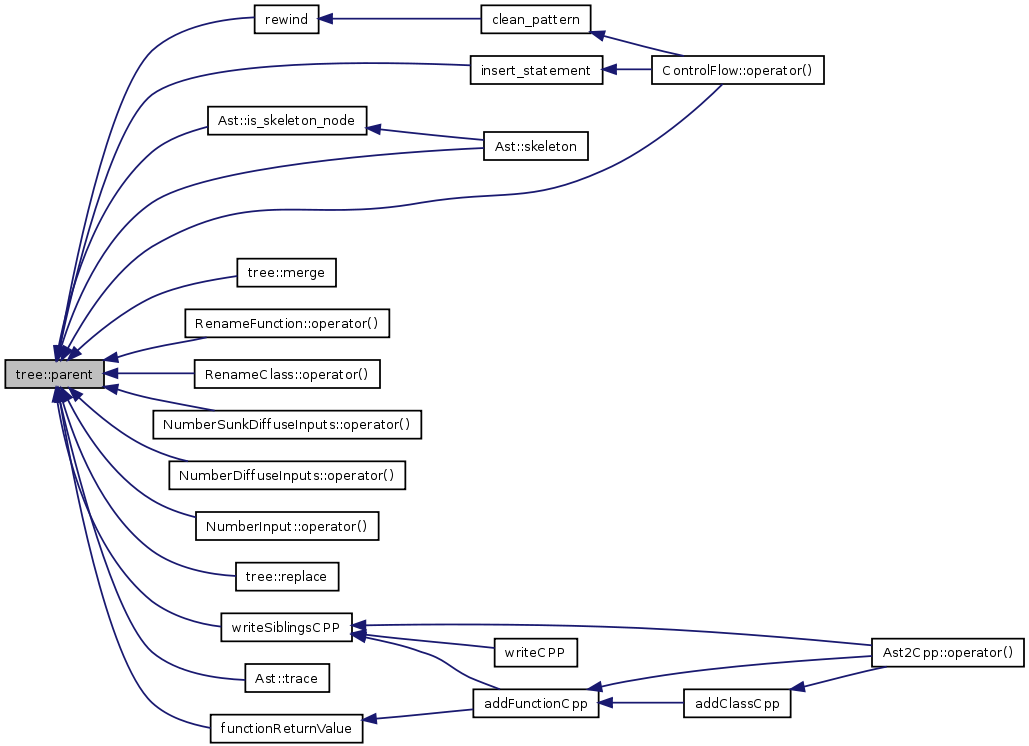
| iter tree< T, tree_node_allocator >::previous_sibling | ( | iter | position | ) | const [inline] |
| iter tree< T, tree_node_allocator >::next_sibling | ( | iter | position | ) | const [inline] |
| iter tree< T, tree_node_allocator >::next_at_same_depth | ( | iter | position | ) | const [inline] |
Return iterator to the next node at a given depth.
Definition at line 779 of file tree.h.
00780 { 00781 assert(position.node!=0); 00782 iter ret(position); 00783 00784 if(position.node->next_sibling) { 00785 ret.node=position.node->next_sibling; 00786 } 00787 else { 00788 int relative_depth=0; 00789 upper: 00790 do { 00791 ret.node=ret.node->parent; 00792 if(ret.node==0) return ret; 00793 --relative_depth; 00794 } while(ret.node->next_sibling==0); 00795 lower: 00796 ret.node=ret.node->next_sibling; 00797 while(ret.node->first_child==0) { 00798 if(ret.node->next_sibling==0) 00799 goto upper; 00800 ret.node=ret.node->next_sibling; 00801 if(ret.node==0) return ret; 00802 } 00803 while(relative_depth<0 && ret.node->first_child!=0) { 00804 ret.node=ret.node->first_child; 00805 ++relative_depth; 00806 } 00807 if(relative_depth<0) { 00808 if(ret.node->next_sibling==0) goto upper; 00809 else goto lower; 00810 } 00811 } 00812 return ret; 00813 }
| void tree< T, tree_node_allocator >::clear | ( | ) | [inline] |
Erase all nodes of the tree.
Definition at line 582 of file tree.h.
References tree< T, tree_node_allocator >::erase(), tree< T, tree_node_allocator >::feet, tree< T, tree_node_allocator >::head, and tree_node_< T >::next_sibling.
Referenced by tree< T, tree_node_allocator >::copy_(), and tree< T, tree_node_allocator >::~tree().
00583 { 00584 if(head) 00585 while(head->next_sibling!=feet) 00586 erase(pre_order_iterator(head->next_sibling)); 00587 }


| iter tree< T, tree_node_allocator >::erase | ( | iter | it | ) | [inline] |
Erase element at position pointed to by iterator, return incremented iterator.
Definition at line 612 of file tree.h.
References tree< T, tree_node_allocator >::alloc_, tree_node_< T >::data, kp::destructor(), tree< T, tree_node_allocator >::erase_children(), tree< T, tree_node_allocator >::head, tree_node_< T >::next_sibling, tree_node_< T >::parent, and tree_node_< T >::prev_sibling.
Referenced by clean_pattern(), tree< T, tree_node_allocator >::clear(), move_branch(), tree< T, tree_node_allocator >::move_ontop(), and tree< T, tree_node_allocator >::replace().
00613 { 00614 tree_node *cur=it.node; 00615 assert(cur!=head); 00616 iter ret=it; 00617 ret.skip_children(); 00618 ++ret; 00619 erase_children(it); 00620 if(cur->prev_sibling==0) { 00621 cur->parent->first_child=cur->next_sibling; 00622 } 00623 else { 00624 cur->prev_sibling->next_sibling=cur->next_sibling; 00625 } 00626 if(cur->next_sibling==0) { 00627 cur->parent->last_child=cur->prev_sibling; 00628 } 00629 else { 00630 cur->next_sibling->prev_sibling=cur->prev_sibling; 00631 } 00632 00633 kp::destructor(&cur->data); 00634 alloc_.deallocate(cur,1); 00635 return ret; 00636 }

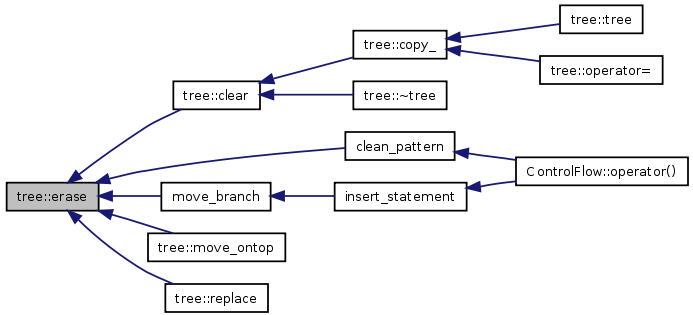
| void tree< T, tree_node_allocator >::erase_children | ( | const iterator_base & | it | ) | [inline] |
Erase all children of the node pointed to by iterator.
Definition at line 590 of file tree.h.
References tree< T, tree_node_allocator >::alloc_, tree_node_< T >::data, kp::destructor(), and tree_node_< T >::next_sibling.
Referenced by tree< T, tree_node_allocator >::erase(), and tree< T, tree_node_allocator >::replace().
00591 { 00592 // std::cout << "erase_children " << it.node << std::endl; 00593 if(it.node==0) return; 00594 00595 tree_node *cur=it.node->first_child; 00596 tree_node *prev=0; 00597 00598 while(cur!=0) { 00599 prev=cur; 00600 cur=cur->next_sibling; 00601 erase_children(pre_order_iterator(prev)); 00602 kp::destructor(&prev->data); 00603 alloc_.deallocate(prev,1); 00604 } 00605 it.node->first_child=0; 00606 it.node->last_child=0; 00607 // std::cout << "exit" << std::endl; 00608 }

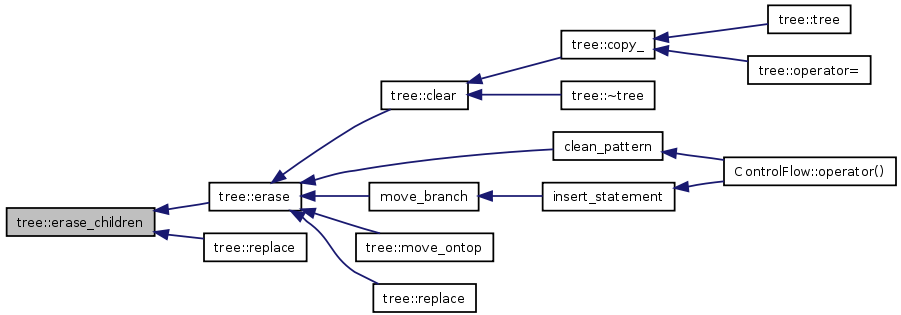
| iter tree< T, tree_node_allocator >::append_child | ( | iter | position | ) | [inline] |
Insert empty node as last/first child of node pointed to by position.
Definition at line 817 of file tree.h.
References tree< T, tree_node_allocator >::alloc_, kp::constructor(), tree_node_< T >::data, tree_node_< T >::first_child, tree< T, tree_node_allocator >::head, tree_node_< T >::last_child, tree_node_< T >::next_sibling, tree_node_< T >::parent, and tree_node_< T >::prev_sibling.
Referenced by tree< T, tree_node_allocator >::append_child(), copy_branch(), insert_branch(), insert_statement(), tree< T, tree_node_allocator >::merge(), tree< T, tree_node_allocator >::replace(), and Ast::walk().
00818 { 00819 assert(position.node!=head); 00820 assert(position.node); 00821 00822 tree_node *tmp=alloc_.allocate(1,0); 00823 kp::constructor(&tmp->data); 00824 tmp->first_child=0; 00825 tmp->last_child=0; 00826 00827 tmp->parent=position.node; 00828 if(position.node->last_child!=0) { 00829 position.node->last_child->next_sibling=tmp; 00830 } 00831 else { 00832 position.node->first_child=tmp; 00833 } 00834 tmp->prev_sibling=position.node->last_child; 00835 position.node->last_child=tmp; 00836 tmp->next_sibling=0; 00837 return tmp; 00838 }

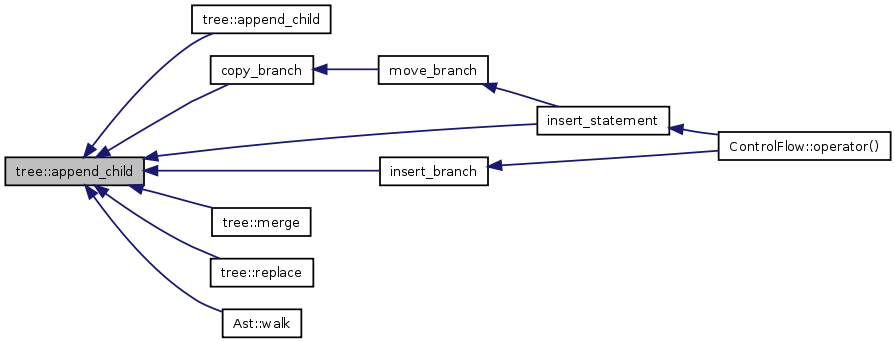
| iter tree< T, tree_node_allocator >::prepend_child | ( | iter | position | ) | [inline] |
Definition at line 842 of file tree.h.
References tree< T, tree_node_allocator >::alloc_, kp::constructor(), tree_node_< T >::data, tree_node_< T >::first_child, tree< T, tree_node_allocator >::head, tree_node_< T >::last_child, tree_node_< T >::next_sibling, tree_node_< T >::parent, and tree_node_< T >::prev_sibling.
Referenced by tree< T, tree_node_allocator >::prepend_child().
00843 { 00844 assert(position.node!=head); 00845 assert(position.node); 00846 00847 tree_node *tmp=alloc_.allocate(1,0); 00848 kp::constructor(&tmp->data); 00849 tmp->first_child=0; 00850 tmp->last_child=0; 00851 00852 tmp->parent=position.node; 00853 if(position.node->first_child!=0) { 00854 position.node->first_child->prev_sibling=tmp; 00855 } 00856 else { 00857 position.node->last_child=tmp; 00858 } 00859 tmp->next_sibling=position.node->first_child; 00860 position.node->prev_child=tmp; 00861 tmp->prev_sibling=0; 00862 return tmp; 00863 }


| iter tree< T, tree_node_allocator >::append_child | ( | iter | position, | |
| const T & | x | |||
| ) | [inline] |
Insert node as last/first child of node pointed to by position.
Definition at line 867 of file tree.h.
References tree< T, tree_node_allocator >::alloc_, kp::constructor(), tree_node_< T >::data, tree_node_< T >::first_child, tree< T, tree_node_allocator >::head, tree_node_< T >::last_child, tree_node_< T >::next_sibling, tree_node_< T >::parent, and tree_node_< T >::prev_sibling.
00868 { 00869 // If your program fails here you probably used 'append_child' to add the top 00870 // node to an empty tree. From version 1.45 the top element should be added 00871 // using 'insert'. See the documentation for further information, and sorry about 00872 // the API change. 00873 assert(position.node!=head); 00874 assert(position.node); 00875 00876 tree_node* tmp = alloc_.allocate(1,0); 00877 kp::constructor(&tmp->data, x); 00878 tmp->first_child=0; 00879 tmp->last_child=0; 00880 00881 tmp->parent=position.node; 00882 if(position.node->last_child!=0) { 00883 position.node->last_child->next_sibling=tmp; 00884 } 00885 else { 00886 position.node->first_child=tmp; 00887 } 00888 tmp->prev_sibling=position.node->last_child; 00889 position.node->last_child=tmp; 00890 tmp->next_sibling=0; 00891 return tmp; 00892 }

| iter tree< T, tree_node_allocator >::prepend_child | ( | iter | position, | |
| const T & | x | |||
| ) | [inline] |
Definition at line 896 of file tree.h.
References tree< T, tree_node_allocator >::alloc_, kp::constructor(), tree_node_< T >::data, tree_node_< T >::first_child, tree< T, tree_node_allocator >::head, tree_node_< T >::last_child, tree_node_< T >::next_sibling, tree_node_< T >::parent, and tree_node_< T >::prev_sibling.
00897 { 00898 assert(position.node!=head); 00899 assert(position.node); 00900 00901 tree_node* tmp = alloc_.allocate(1,0); 00902 kp::constructor(&tmp->data, x); 00903 tmp->first_child=0; 00904 tmp->last_child=0; 00905 00906 tmp->parent=position.node; 00907 if(position.node->first_child!=0) { 00908 position.node->first_child->prev_sibling=tmp; 00909 } 00910 else { 00911 position.node->last_child=tmp; 00912 } 00913 tmp->next_sibling=position.node->first_child; 00914 position.node->first_child=tmp; 00915 tmp->prev_sibling=0; 00916 return tmp; 00917 }

| iter tree< T, tree_node_allocator >::append_child | ( | iter | position, | |
| iter | other_position | |||
| ) | [inline] |
Append the node (plus its children) at other_position as last/first child of position.
Definition at line 921 of file tree.h.
References tree< T, tree_node_allocator >::append_child(), tree< T, tree_node_allocator >::head, and tree< T, tree_node_allocator >::replace().
00922 { 00923 assert(position.node!=head); 00924 assert(position.node); 00925 00926 sibling_iterator aargh=append_child(position, value_type()); 00927 return replace(aargh, other); 00928 }

| iter tree< T, tree_node_allocator >::prepend_child | ( | iter | position, | |
| iter | other_position | |||
| ) | [inline] |
Definition at line 932 of file tree.h.
References tree< T, tree_node_allocator >::head, tree< T, tree_node_allocator >::prepend_child(), and tree< T, tree_node_allocator >::replace().
00933 { 00934 assert(position.node!=head); 00935 assert(position.node); 00936 00937 sibling_iterator aargh=prepend_child(position, value_type()); 00938 return replace(aargh, other); 00939 }

| iter tree< T, tree_node_allocator >::append_children | ( | iter | position, | |
| sibling_iterator | from, | |||
| sibling_iterator | to | |||
| ) | [inline] |
Append the nodes in the from-to range (plus their children) as last/first children of position.
Definition at line 943 of file tree.h.
References tree< T, tree_node_allocator >::head, and tree< T, tree_node_allocator >::insert_subtree().
00944 { 00945 assert(position.node!=head); 00946 assert(position.node); 00947 00948 iter ret=from; 00949 00950 while(from!=to) { 00951 insert_subtree(position.end(), from); 00952 ++from; 00953 } 00954 return ret; 00955 }

| iter tree< T, tree_node_allocator >::prepend_children | ( | iter | position, | |
| sibling_iterator | from, | |||
| sibling_iterator | to | |||
| ) | [inline] |
Definition at line 959 of file tree.h.
References tree< T, tree_node_allocator >::head, and tree< T, tree_node_allocator >::insert_subtree().
00960 { 00961 assert(position.node!=head); 00962 assert(position.node); 00963 00964 iter ret=from; 00965 00966 while(from!=to) { 00967 insert_subtree(position.begin(), from); 00968 ++from; 00969 } 00970 return ret; 00971 }

| tree< T, tree_node_allocator >::pre_order_iterator tree< T, tree_node_allocator >::set_head | ( | const T & | x | ) | [inline] |
Short-hand to insert topmost node in otherwise empty tree.
Definition at line 974 of file tree.h.
References tree< T, tree_node_allocator >::feet, tree< T, tree_node_allocator >::head, tree< T, tree_node_allocator >::insert(), and tree_node_< T >::next_sibling.
Referenced by tree< T, tree_node_allocator >::subtree(), and tree< T, tree_node_allocator >::tree().


| iter tree< T, tree_node_allocator >::insert | ( | iter | position, | |
| const T & | x | |||
| ) | [inline] |
Insert node as previous sibling of node pointed to by position.
Definition at line 982 of file tree.h.
References tree< T, tree_node_allocator >::alloc_, kp::constructor(), tree_node_< T >::data, tree< T, tree_node_allocator >::feet, tree_node_< T >::first_child, tree_node_< T >::last_child, tree_node_< T >::next_sibling, tree_node_< T >::parent, and tree_node_< T >::prev_sibling.
Referenced by tree< T, tree_node_allocator >::copy_(), tree< T, tree_node_allocator >::insert_subtree(), tree< T, tree_node_allocator >::set_head(), and tree< T, tree_node_allocator >::wrap().
00983 { 00984 if(position.node==0) { 00985 position.node=feet; // Backward compatibility: when calling insert on a null node, 00986 // insert before the feet. 00987 } 00988 tree_node* tmp = alloc_.allocate(1,0); 00989 kp::constructor(&tmp->data, x); 00990 tmp->first_child=0; 00991 tmp->last_child=0; 00992 00993 tmp->parent=position.node->parent; 00994 tmp->next_sibling=position.node; 00995 tmp->prev_sibling=position.node->prev_sibling; 00996 position.node->prev_sibling=tmp; 00997 00998 if(tmp->prev_sibling==0) { 00999 if(tmp->parent) // when inserting nodes at the head, there is no parent 01000 tmp->parent->first_child=tmp; 01001 } 01002 else 01003 tmp->prev_sibling->next_sibling=tmp; 01004 return tmp; 01005 }

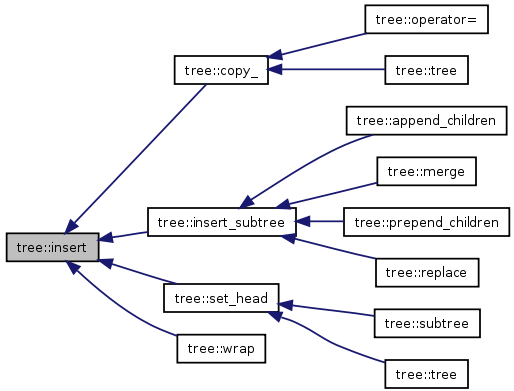
| tree< T, tree_node_allocator >::sibling_iterator tree< T, tree_node_allocator >::insert | ( | sibling_iterator | position, | |
| const T & | x | |||
| ) | [inline] |
Specialisation of previous member.
Definition at line 1008 of file tree.h.
References tree< T, tree_node_allocator >::alloc_, kp::constructor(), tree_node_< T >::data, tree_node_< T >::first_child, tree_node_< T >::last_child, tree_node_< T >::next_sibling, tree< T, tree_node_allocator >::iterator_base::node, tree_node_< T >::parent, tree< T, tree_node_allocator >::sibling_iterator::parent_, tree_node_< T >::prev_sibling, and tree< T, tree_node_allocator >::sibling_iterator::range_last().
01009 { 01010 tree_node* tmp = alloc_.allocate(1,0); 01011 kp::constructor(&tmp->data, x); 01012 tmp->first_child=0; 01013 tmp->last_child=0; 01014 01015 tmp->next_sibling=position.node; 01016 if(position.node==0) { // iterator points to end of a subtree 01017 tmp->parent=position.parent_; 01018 tmp->prev_sibling=position.range_last(); 01019 tmp->parent->last_child=tmp; 01020 } 01021 else { 01022 tmp->parent=position.node->parent; 01023 tmp->prev_sibling=position.node->prev_sibling; 01024 position.node->prev_sibling=tmp; 01025 } 01026 01027 if(tmp->prev_sibling==0) { 01028 if(tmp->parent) // when inserting nodes at the head, there is no parent 01029 tmp->parent->first_child=tmp; 01030 } 01031 else 01032 tmp->prev_sibling->next_sibling=tmp; 01033 return tmp; 01034 }

| iter tree< T, tree_node_allocator >::insert_subtree | ( | iter | position, | |
| const iterator_base & | subtree | |||
| ) | [inline] |
Insert node (with children) pointed to by subtree as previous sibling of node pointed to by position.
Definition at line 1062 of file tree.h.
References tree< T, tree_node_allocator >::insert(), and tree< T, tree_node_allocator >::replace().
Referenced by tree< T, tree_node_allocator >::append_children(), tree< T, tree_node_allocator >::merge(), tree< T, tree_node_allocator >::prepend_children(), and tree< T, tree_node_allocator >::replace().
01063 { 01064 // insert dummy 01065 iter it=insert(position, value_type()); 01066 // replace dummy with subtree 01067 return replace(it, subtree); 01068 }

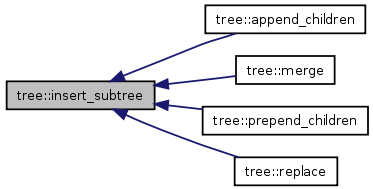
| iter tree< T, tree_node_allocator >::insert_after | ( | iter | position, | |
| const T & | x | |||
| ) | [inline] |
Insert node as next sibling of node pointed to by position.
Definition at line 1038 of file tree.h.
References tree< T, tree_node_allocator >::alloc_, kp::constructor(), tree_node_< T >::data, tree_node_< T >::first_child, tree_node_< T >::last_child, tree_node_< T >::next_sibling, tree_node_< T >::parent, and tree_node_< T >::prev_sibling.
Referenced by tree< T, tree_node_allocator >::insert_subtree_after().
01039 { 01040 tree_node* tmp = alloc_.allocate(1,0); 01041 kp::constructor(&tmp->data, x); 01042 tmp->first_child=0; 01043 tmp->last_child=0; 01044 01045 tmp->parent=position.node->parent; 01046 tmp->prev_sibling=position.node; 01047 tmp->next_sibling=position.node->next_sibling; 01048 position.node->next_sibling=tmp; 01049 01050 if(tmp->next_sibling==0) { 01051 if(tmp->parent) // when inserting nodes at the head, there is no parent 01052 tmp->parent->last_child=tmp; 01053 } 01054 else { 01055 tmp->next_sibling->prev_sibling=tmp; 01056 } 01057 return tmp; 01058 }


| iter tree< T, tree_node_allocator >::insert_subtree_after | ( | iter | position, | |
| const iterator_base & | subtree | |||
| ) | [inline] |
Insert node (with children) pointed to by subtree as next sibling of node pointed to by position.
Definition at line 1072 of file tree.h.
References tree< T, tree_node_allocator >::insert_after(), and tree< T, tree_node_allocator >::replace().
01073 { 01074 // insert dummy 01075 iter it=insert_after(position, value_type()); 01076 // replace dummy with subtree 01077 return replace(it, subtree); 01078 }

| iter tree< T, tree_node_allocator >::replace | ( | iter | position, | |
| const T & | x | |||
| ) | [inline] |
Replace node at 'position' with other node (keeping same children); 'position' becomes invalid.
Definition at line 1092 of file tree.h.
References kp::constructor(), and kp::destructor().
Referenced by tree< T, tree_node_allocator >::append_child(), tree< T, tree_node_allocator >::copy_(), tree< T, tree_node_allocator >::insert_subtree(), tree< T, tree_node_allocator >::insert_subtree_after(), tree< T, tree_node_allocator >::prepend_child(), tree< T, tree_node_allocator >::subtree(), and tree< T, tree_node_allocator >::tree().
01093 { 01094 kp::destructor(&position.node->data); 01095 kp::constructor(&position.node->data, x); 01096 return position; 01097 }

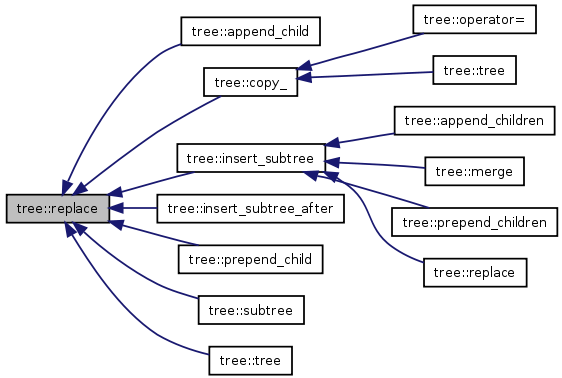
| iter tree< T, tree_node_allocator >::replace | ( | iter | position, | |
| const iterator_base & | from | |||
| ) | [inline] |
Replace node at 'position' with subtree starting at 'from' (do not erase subtree at 'from'); see above.
Definition at line 1101 of file tree.h.
References tree< T, tree_node_allocator >::alloc_, tree< T, tree_node_allocator >::append_child(), kp::constructor(), tree_node_< T >::data, kp::destructor(), tree< T, tree_node_allocator >::erase_children(), tree_node_< T >::first_child, tree< T, tree_node_allocator >::head, tree_node_< T >::last_child, tree_node_< T >::next_sibling, tree< T, tree_node_allocator >::parent(), tree_node_< T >::parent, and tree_node_< T >::prev_sibling.
01102 { 01103 assert(position.node!=head); 01104 tree_node *current_from=from.node; 01105 tree_node *start_from=from.node; 01106 tree_node *current_to =position.node; 01107 01108 // replace the node at position with head of the replacement tree at from 01109 // std::cout << "warning!" << position.node << std::endl; 01110 erase_children(position); 01111 // std::cout << "no warning!" << std::endl; 01112 tree_node* tmp = alloc_.allocate(1,0); 01113 kp::constructor(&tmp->data, (*from)); 01114 tmp->first_child=0; 01115 tmp->last_child=0; 01116 if(current_to->prev_sibling==0) { 01117 if(current_to->parent!=0) 01118 current_to->parent->first_child=tmp; 01119 } 01120 else { 01121 current_to->prev_sibling->next_sibling=tmp; 01122 } 01123 tmp->prev_sibling=current_to->prev_sibling; 01124 if(current_to->next_sibling==0) { 01125 if(current_to->parent!=0) 01126 current_to->parent->last_child=tmp; 01127 } 01128 else { 01129 current_to->next_sibling->prev_sibling=tmp; 01130 } 01131 tmp->next_sibling=current_to->next_sibling; 01132 tmp->parent=current_to->parent; 01133 kp::destructor(¤t_to->data); 01134 alloc_.deallocate(current_to,1); 01135 current_to=tmp; 01136 01137 // only at this stage can we fix 'last' 01138 tree_node *last=from.node->next_sibling; 01139 01140 pre_order_iterator toit=tmp; 01141 // copy all children 01142 do { 01143 assert(current_from!=0); 01144 if(current_from->first_child != 0) { 01145 current_from=current_from->first_child; 01146 toit=append_child(toit, current_from->data); 01147 } 01148 else { 01149 while(current_from->next_sibling==0 && current_from!=start_from) { 01150 current_from=current_from->parent; 01151 toit=parent(toit); 01152 assert(current_from!=0); 01153 } 01154 current_from=current_from->next_sibling; 01155 if(current_from!=last) { 01156 toit=append_child(parent(toit), current_from->data); 01157 } 01158 } 01159 } while(current_from!=last); 01160 01161 return current_to; 01162 }
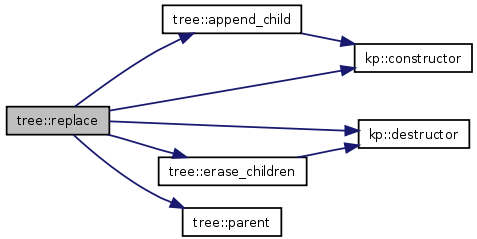
| tree< T, tree_node_allocator >::sibling_iterator tree< T, tree_node_allocator >::replace | ( | sibling_iterator | orig_begin, | |
| sibling_iterator | orig_end, | |||
| sibling_iterator | new_begin, | |||
| sibling_iterator | new_end | |||
| ) | [inline] |
Replace string of siblings (plus their children) with copy of a new string (with children); see above.
Definition at line 1165 of file tree.h.
References tree< T, tree_node_allocator >::erase(), tree< T, tree_node_allocator >::insert_subtree(), tree_node_< T >::next_sibling, and tree< T, tree_node_allocator >::iterator_base::node.
01170 { 01171 tree_node *orig_first=orig_begin.node; 01172 tree_node *new_first=new_begin.node; 01173 tree_node *orig_last=orig_first; 01174 while((++orig_begin)!=orig_end) 01175 orig_last=orig_last->next_sibling; 01176 tree_node *new_last=new_first; 01177 while((++new_begin)!=new_end) 01178 new_last=new_last->next_sibling; 01179 01180 // insert all siblings in new_first..new_last before orig_first 01181 bool first=true; 01182 pre_order_iterator ret; 01183 while(1==1) { 01184 pre_order_iterator tt=insert_subtree(pre_order_iterator(orig_first), pre_order_iterator(new_first)); 01185 if(first) { 01186 ret=tt; 01187 first=false; 01188 } 01189 if(new_first==new_last) 01190 break; 01191 new_first=new_first->next_sibling; 01192 } 01193 01194 // erase old range of siblings 01195 bool last=false; 01196 tree_node *next=orig_first; 01197 while(1==1) { 01198 if(next==orig_last) 01199 last=true; 01200 next=next->next_sibling; 01201 erase((pre_order_iterator)orig_first); 01202 if(last) 01203 break; 01204 orig_first=next; 01205 } 01206 return ret; 01207 }

| iter tree< T, tree_node_allocator >::flatten | ( | iter | position | ) | [inline] |
Move all children of node at 'position' to be siblings, returns position.
Definition at line 1211 of file tree.h.
References tree_node_< T >::next_sibling, and tree_node_< T >::parent.
01212 { 01213 if(position.node->first_child==0) 01214 return position; 01215 01216 tree_node *tmp=position.node->first_child; 01217 while(tmp) { 01218 tmp->parent=position.node->parent; 01219 tmp=tmp->next_sibling; 01220 } 01221 if(position.node->next_sibling) { 01222 position.node->last_child->next_sibling=position.node->next_sibling; 01223 position.node->next_sibling->prev_sibling=position.node->last_child; 01224 } 01225 else { 01226 position.node->parent->last_child=position.node->last_child; 01227 } 01228 position.node->next_sibling=position.node->first_child; 01229 position.node->next_sibling->prev_sibling=position.node; 01230 position.node->first_child=0; 01231 position.node->last_child=0; 01232 01233 return position; 01234 }
| iter tree< T, tree_node_allocator >::reparent | ( | iter | position, | |
| sibling_iterator | begin, | |||
| sibling_iterator | end | |||
| ) | [inline] |
Move nodes in range to be children of 'position'.
Definition at line 1239 of file tree.h.
References tree_node_< T >::last_child, tree_node_< T >::next_sibling, tree< T, tree_node_allocator >::iterator_base::node, tree_node_< T >::parent, and tree_node_< T >::prev_sibling.
Referenced by tree< T, tree_node_allocator >::reparent(), Ast::skeleton(), and tree< T, tree_node_allocator >::wrap().
01240 { 01241 tree_node *first=begin.node; 01242 tree_node *last=first; 01243 01244 assert(first!=position.node); 01245 01246 if(begin==end) return begin; 01247 // determine last node 01248 while((++begin)!=end) { 01249 last=last->next_sibling; 01250 } 01251 // move subtree 01252 if(first->prev_sibling==0) { 01253 first->parent->first_child=last->next_sibling; 01254 } 01255 else { 01256 first->prev_sibling->next_sibling=last->next_sibling; 01257 } 01258 if(last->next_sibling==0) { 01259 last->parent->last_child=first->prev_sibling; 01260 } 01261 else { 01262 last->next_sibling->prev_sibling=first->prev_sibling; 01263 } 01264 if(position.node->first_child==0) { 01265 position.node->first_child=first; 01266 position.node->last_child=last; 01267 first->prev_sibling=0; 01268 } 01269 else { 01270 position.node->last_child->next_sibling=first; 01271 first->prev_sibling=position.node->last_child; 01272 position.node->last_child=last; 01273 } 01274 last->next_sibling=0; 01275 01276 tree_node *pos=first; 01277 while(1==1) { 01278 pos->parent=position.node; 01279 if(pos==last) break; 01280 pos=pos->next_sibling; 01281 } 01282 01283 return first; 01284 }
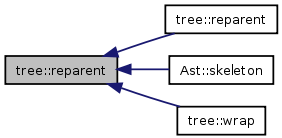
| iter tree< T, tree_node_allocator >::reparent | ( | iter | position, | |
| iter | from | |||
| ) | [inline] |
Move all child nodes of 'from' to be children of 'position'.
Definition at line 1287 of file tree.h.
References tree< T, tree_node_allocator >::end(), and tree< T, tree_node_allocator >::reparent().
01288 { 01289 if(from.node->first_child==0) return position; 01290 return reparent(position, from.node->first_child, end(from)); 01291 }

| iter tree< T, tree_node_allocator >::wrap | ( | iter | position, | |
| const T & | x | |||
| ) | [inline] |
Replace node with a new node, making the old node a child of the new node.
Definition at line 1294 of file tree.h.
References tree< T, tree_node_allocator >::insert(), and tree< T, tree_node_allocator >::reparent().
01295 { 01296 assert(position.node!=0); 01297 sibling_iterator fr=position, to=position; 01298 ++to; 01299 iter ret = insert(position, x); 01300 reparent(ret, fr, to); 01301 return ret; 01302 }

| iter tree< T, tree_node_allocator >::move_after | ( | iter | target, | |
| iter | source | |||
| ) | [inline] |
Move 'source' node (plus its children) to become the next sibling of 'target'.
Definition at line 1305 of file tree.h.
References tree_node_< T >::next_sibling, tree_node_< T >::parent, and tree_node_< T >::prev_sibling.
01306 { 01307 tree_node *dst=target.node; 01308 tree_node *src=source.node; 01309 assert(dst); 01310 assert(src); 01311 01312 if(dst==src) return source; 01313 if(dst->next_sibling) 01314 if(dst->next_sibling==src) // already in the right spot 01315 return source; 01316 01317 // take src out of the tree 01318 if(src->prev_sibling!=0) src->prev_sibling->next_sibling=src->next_sibling; 01319 else src->parent->first_child=src->next_sibling; 01320 if(src->next_sibling!=0) src->next_sibling->prev_sibling=src->prev_sibling; 01321 else src->parent->last_child=src->prev_sibling; 01322 01323 // connect it to the new point 01324 if(dst->next_sibling!=0) dst->next_sibling->prev_sibling=src; 01325 else dst->parent->last_child=src; 01326 src->next_sibling=dst->next_sibling; 01327 dst->next_sibling=src; 01328 src->prev_sibling=dst; 01329 src->parent=dst->parent; 01330 return src; 01331 }
| iter tree< T, tree_node_allocator >::move_before | ( | iter | target, | |
| iter | source | |||
| ) | [inline] |
Move 'source' node (plus its children) to become the previous sibling of 'target'.
Definition at line 1334 of file tree.h.
References tree_node_< T >::next_sibling, tree_node_< T >::parent, and tree_node_< T >::prev_sibling.
01335 { 01336 tree_node *dst=target.node; 01337 tree_node *src=source.node; 01338 assert(dst); 01339 assert(src); 01340 01341 if(dst==src) return source; 01342 if(dst->prev_sibling) 01343 if(dst->prev_sibling==src) // already in the right spot 01344 return source; 01345 01346 // take src out of the tree 01347 if(src->prev_sibling!=0) src->prev_sibling->next_sibling=src->next_sibling; 01348 else src->parent->first_child=src->next_sibling; 01349 if(src->next_sibling!=0) src->next_sibling->prev_sibling=src->prev_sibling; 01350 else src->parent->last_child=src->prev_sibling; 01351 01352 // connect it to the new point 01353 if(dst->prev_sibling!=0) dst->prev_sibling->next_sibling=src; 01354 else dst->parent->first_child=src; 01355 src->prev_sibling=dst->prev_sibling; 01356 dst->prev_sibling=src; 01357 src->next_sibling=dst; 01358 src->parent=dst->parent; 01359 return src; 01360 }
| tree< T, tree_node_allocator >::sibling_iterator tree< T, tree_node_allocator >::move_before | ( | sibling_iterator | target, | |
| sibling_iterator | source | |||
| ) | [inline] |
Definition at line 1364 of file tree.h.
References tree_node_< T >::first_child, tree_node_< T >::last_child, tree_node_< T >::next_sibling, tree< T, tree_node_allocator >::iterator_base::node, tree_node_< T >::parent, tree< T, tree_node_allocator >::sibling_iterator::parent_, and tree_node_< T >::prev_sibling.
01366 { 01367 tree_node *dst=target.node; 01368 tree_node *src=source.node; 01369 tree_node *dst_prev_sibling; 01370 if(dst==0) { // must then be an end iterator 01371 dst_prev_sibling=target.parent_->last_child; 01372 assert(dst_prev_sibling); 01373 } 01374 else dst_prev_sibling=dst->prev_sibling; 01375 assert(src); 01376 01377 if(dst==src) return source; 01378 if(dst_prev_sibling) 01379 if(dst_prev_sibling==src) // already in the right spot 01380 return source; 01381 01382 // take src out of the tree 01383 if(src->prev_sibling!=0) src->prev_sibling->next_sibling=src->next_sibling; 01384 else src->parent->first_child=src->next_sibling; 01385 if(src->next_sibling!=0) src->next_sibling->prev_sibling=src->prev_sibling; 01386 else src->parent->last_child=src->prev_sibling; 01387 01388 // connect it to the new point 01389 if(dst_prev_sibling!=0) dst_prev_sibling->next_sibling=src; 01390 else target.parent_->first_child=src; 01391 src->prev_sibling=dst_prev_sibling; 01392 if(dst) { 01393 dst->prev_sibling=src; 01394 src->parent=dst->parent; 01395 } 01396 src->next_sibling=dst; 01397 return src; 01398 }
| iter tree< T, tree_node_allocator >::move_ontop | ( | iter | target, | |
| iter | source | |||
| ) | [inline] |
Move 'source' node (plus its children) to become the node at 'target' (erasing the node at 'target').
Definition at line 1401 of file tree.h.
References tree< T, tree_node_allocator >::erase(), tree_node_< T >::first_child, tree_node_< T >::last_child, tree_node_< T >::next_sibling, tree_node_< T >::parent, and tree_node_< T >::prev_sibling.
01402 { 01403 tree_node *dst=target.node; 01404 tree_node *src=source.node; 01405 assert(dst); 01406 assert(src); 01407 01408 if(dst==src) return source; 01409 01410 // remember connection points 01411 tree_node *b_prev_sibling=dst->prev_sibling; 01412 tree_node *b_next_sibling=dst->next_sibling; 01413 tree_node *b_parent=dst->parent; 01414 01415 // remove target 01416 erase(target); 01417 01418 // take src out of the tree 01419 if(src->prev_sibling!=0) src->prev_sibling->next_sibling=src->next_sibling; 01420 else src->parent->first_child=src->next_sibling; 01421 if(src->next_sibling!=0) src->next_sibling->prev_sibling=src->prev_sibling; 01422 else src->parent->last_child=src->prev_sibling; 01423 01424 // connect it to the new point 01425 if(b_prev_sibling!=0) b_prev_sibling->next_sibling=src; 01426 else b_parent->first_child=src; 01427 if(b_next_sibling!=0) b_next_sibling->prev_sibling=src; 01428 else b_parent->last_child=src; 01429 src->prev_sibling=b_prev_sibling; 01430 src->next_sibling=b_next_sibling; 01431 src->parent=b_parent; 01432 return src; 01433 }

| void tree< T, tree_node_allocator >::merge | ( | sibling_iterator | to1, | |
| sibling_iterator | to2, | |||
| sibling_iterator | from1, | |||
| sibling_iterator | from2, | |||
| bool | duplicate_leaves = false | |||
| ) | [inline] |
Merge with other tree, creating new branches and leaves only if they are not already present.
Definition at line 1436 of file tree.h.
References tree< T, tree_node_allocator >::append_child(), tree< T, tree_node_allocator >::iterator_base::begin(), tree< T, tree_node_allocator >::iterator_base::end(), tree< T, tree_node_allocator >::insert_subtree(), and tree< T, tree_node_allocator >::parent().
01439 { 01440 sibling_iterator fnd; 01441 while(from1!=from2) { 01442 if((fnd=std::find(to1, to2, (*from1))) != to2) { // element found 01443 if(from1.begin()==from1.end()) { // full depth reached 01444 if(duplicate_leaves) 01445 append_child(parent(to1), (*from1)); 01446 } 01447 else { // descend further 01448 merge(fnd.begin(), fnd.end(), from1.begin(), from1.end(), duplicate_leaves); 01449 } 01450 } 01451 else { // element missing 01452 insert_subtree(to2, from1); 01453 } 01454 ++from1; 01455 } 01456 }

| void tree< T, tree_node_allocator >::sort | ( | sibling_iterator | from, | |
| sibling_iterator | to, | |||
| bool | deep = false | |||
| ) | [inline] |
Sort (std::sort only moves values of nodes, this one moves children as well).
Definition at line 1460 of file tree.h.
Referenced by tree< T, tree_node_allocator >::sort().
01461 { 01462 std::less<T> comp; 01463 sort(from, to, comp, deep); 01464 }

| void tree< T, tree_node_allocator >::sort | ( | sibling_iterator | from, | |
| sibling_iterator | to, | |||
| StrictWeakOrdering | comp, | |||
| bool | deep = false | |||
| ) | [inline] |
Definition at line 1468 of file tree.h.
References tree< T, tree_node_allocator >::begin(), tree< T, tree_node_allocator >::end(), tree_node_< T >::next_sibling, tree< T, tree_node_allocator >::iterator_base::node, tree_node_< T >::parent, tree_node_< T >::prev_sibling, and tree< T, tree_node_allocator >::sort().
01470 { 01471 if(from==to) return; 01472 // make list of sorted nodes 01473 // CHECK: if multiset stores equivalent nodes in the order in which they 01474 // are inserted, then this routine should be called 'stable_sort'. 01475 std::multiset<tree_node *, compare_nodes<StrictWeakOrdering> > nodes(comp); 01476 sibling_iterator it=from, it2=to; 01477 while(it != to) { 01478 nodes.insert(it.node); 01479 ++it; 01480 } 01481 // reassemble 01482 --it2; 01483 01484 // prev and next are the nodes before and after the sorted range 01485 tree_node *prev=from.node->prev_sibling; 01486 tree_node *next=it2.node->next_sibling; 01487 typename std::multiset<tree_node *, compare_nodes<StrictWeakOrdering> >::iterator nit=nodes.begin(), eit=nodes.end(); 01488 if(prev==0) { 01489 if((*nit)->parent!=0) // to catch "sorting the head" situations, when there is no parent 01490 (*nit)->parent->first_child=(*nit); 01491 } 01492 else prev->next_sibling=(*nit); 01493 01494 --eit; 01495 while(nit!=eit) { 01496 (*nit)->prev_sibling=prev; 01497 if(prev) 01498 prev->next_sibling=(*nit); 01499 prev=(*nit); 01500 ++nit; 01501 } 01502 // prev now points to the last-but-one node in the sorted range 01503 if(prev) 01504 prev->next_sibling=(*eit); 01505 01506 // eit points to the last node in the sorted range. 01507 (*eit)->next_sibling=next; 01508 (*eit)->prev_sibling=prev; // missed in the loop above 01509 if(next==0) { 01510 if((*eit)->parent!=0) // to catch "sorting the head" situations, when there is no parent 01511 (*eit)->parent->last_child=(*eit); 01512 } 01513 else next->prev_sibling=(*eit); 01514 01515 if(deep) { // sort the children of each node too 01516 sibling_iterator bcs(*nodes.begin()); 01517 sibling_iterator ecs(*eit); 01518 ++ecs; 01519 while(bcs!=ecs) { 01520 sort(begin(bcs), end(bcs), comp, deep); 01521 ++bcs; 01522 } 01523 } 01524 }
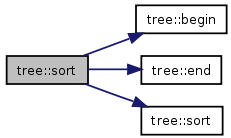
| bool tree< T, tree_node_allocator >::equal | ( | const iter & | one, | |
| const iter & | two, | |||
| const iter & | three | |||
| ) | const [inline] |
Compare two ranges of nodes (compares nodes as well as tree structure).
Definition at line 1528 of file tree.h.
Referenced by tree< T, tree_node_allocator >::equal_subtree().
01529 { 01530 std::equal_to<T> comp; 01531 return equal(one_, two, three_, comp); 01532 }

| bool tree< T, tree_node_allocator >::equal | ( | const iter & | one, | |
| const iter & | two, | |||
| const iter & | three, | |||
| BinaryPredicate | fun | |||
| ) | const [inline] |
Definition at line 1544 of file tree.h.
References tree< T, tree_node_allocator >::is_valid(), and tree< T, tree_node_allocator >::iterator_base::number_of_children().
01545 { 01546 pre_order_iterator one(one_), three(three_); 01547 01548 // if(one==two && is_valid(three) && three.number_of_children()!=0) 01549 // return false; 01550 while(one!=two && is_valid(three)) { 01551 if(!fun(*one,*three)) 01552 return false; 01553 if(one.number_of_children()!=three.number_of_children()) 01554 return false; 01555 ++one; 01556 ++three; 01557 } 01558 return true; 01559 }

| bool tree< T, tree_node_allocator >::equal_subtree | ( | const iter & | one, | |
| const iter & | two | |||
| ) | const [inline] |
Definition at line 1536 of file tree.h.
01537 { 01538 std::equal_to<T> comp; 01539 return equal_subtree(one_, two_, comp); 01540 }
| bool tree< T, tree_node_allocator >::equal_subtree | ( | const iter & | one, | |
| const iter & | two, | |||
| BinaryPredicate | fun | |||
| ) | const [inline] |
Definition at line 1563 of file tree.h.
References tree< T, tree_node_allocator >::begin(), tree< T, tree_node_allocator >::end(), tree< T, tree_node_allocator >::equal(), and tree< T, tree_node_allocator >::number_of_children().
01564 { 01565 pre_order_iterator one(one_), two(two_); 01566 01567 if(!fun(*one,*two)) return false; 01568 if(number_of_children(one)!=number_of_children(two)) return false; 01569 return equal(begin(one),end(one),begin(two),fun); 01570 }
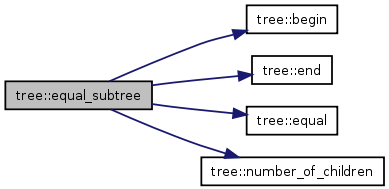
| tree< T, tree_node_allocator > tree< T, tree_node_allocator >::subtree | ( | sibling_iterator | from, | |
| sibling_iterator | to | |||
| ) | const [inline] |
Extract a new tree formed by the range of siblings plus all their children.
Definition at line 1573 of file tree.h.
References tree< T, tree_node_allocator >::begin(), tree< T, tree_node_allocator >::end(), tree< T, tree_node_allocator >::replace(), and tree< T, tree_node_allocator >::set_head().
01574 { 01575 tree tmp; 01576 tmp.set_head(value_type()); 01577 tmp.replace(tmp.begin(), tmp.end(), from, to); 01578 return tmp; 01579 }

| void tree< T, tree_node_allocator >::subtree | ( | tree< T, tree_node_allocator > & | tmp, | |
| sibling_iterator | from, | |||
| sibling_iterator | to | |||
| ) | const [inline] |
Definition at line 1582 of file tree.h.
References tree< T, tree_node_allocator >::begin(), tree< T, tree_node_allocator >::end(), tree< T, tree_node_allocator >::replace(), and tree< T, tree_node_allocator >::set_head().
01583 { 01584 tmp.set_head(value_type()); 01585 tmp.replace(tmp.begin(), tmp.end(), from, to); 01586 }

| void tree< T, tree_node_allocator >::swap | ( | sibling_iterator | it | ) | [inline] |
Exchange the node (plus subtree) with its sibling node (do nothing if no sibling present).
Definition at line 1675 of file tree.h.
References tree_node_< T >::next_sibling, tree< T, tree_node_allocator >::iterator_base::node, tree_node_< T >::parent, and tree_node_< T >::prev_sibling.
Referenced by tree< T, tree_node_allocator >::swap().
01676 { 01677 tree_node *nxt=it.node->next_sibling; 01678 if(nxt) { 01679 if(it.node->prev_sibling) 01680 it.node->prev_sibling->next_sibling=nxt; 01681 else 01682 it.node->parent->first_child=nxt; 01683 nxt->prev_sibling=it.node->prev_sibling; 01684 tree_node *nxtnxt=nxt->next_sibling; 01685 if(nxtnxt) 01686 nxtnxt->prev_sibling=it.node; 01687 else 01688 it.node->parent->last_child=it.node; 01689 nxt->next_sibling=it.node; 01690 it.node->prev_sibling=nxt; 01691 it.node->next_sibling=nxtnxt; 01692 } 01693 }

| void tree< T, tree_node_allocator >::swap | ( | iterator | one, | |
| iterator | two | |||
| ) | [inline] |
Exchange two nodes (plus subtrees).
Definition at line 1696 of file tree.h.
References tree_node_< T >::first_child, tree_node_< T >::last_child, tree_node_< T >::next_sibling, tree< T, tree_node_allocator >::iterator_base::node, tree_node_< T >::parent, tree_node_< T >::prev_sibling, and tree< T, tree_node_allocator >::swap().
01697 { 01698 // if one and two are adjacent siblings, use the sibling swap 01699 if(one.node->next_sibling==two.node) swap(one); 01700 else if(two.node->next_sibling==one.node) swap(two); 01701 else { 01702 tree_node *nxt1=one.node->next_sibling; 01703 tree_node *nxt2=two.node->next_sibling; 01704 tree_node *pre1=one.node->prev_sibling; 01705 tree_node *pre2=two.node->prev_sibling; 01706 tree_node *par1=one.node->parent; 01707 tree_node *par2=two.node->parent; 01708 01709 // reconnect 01710 one.node->parent=par2; 01711 one.node->next_sibling=nxt2; 01712 if(nxt2) nxt2->prev_sibling=one.node; 01713 else par2->last_child=one.node; 01714 one.node->prev_sibling=pre2; 01715 if(pre2) pre2->next_sibling=one.node; 01716 else par2->first_child=one.node; 01717 01718 two.node->parent=par1; 01719 two.node->next_sibling=nxt1; 01720 if(nxt1) nxt1->prev_sibling=two.node; 01721 else par1->last_child=two.node; 01722 two.node->prev_sibling=pre1; 01723 if(pre1) pre1->next_sibling=two.node; 01724 else par1->first_child=two.node; 01725 } 01726 }

| int tree< T, tree_node_allocator >::size | ( | ) | const [inline] |
Count the total number of nodes.
Definition at line 1589 of file tree.h.
References tree< T, tree_node_allocator >::begin(), and tree< T, tree_node_allocator >::end().
01590 { 01591 int i=0; 01592 pre_order_iterator it=begin(), eit=end(); 01593 while(it!=eit) { 01594 ++i; 01595 ++it; 01596 } 01597 return i; 01598 }

| int tree< T, tree_node_allocator >::size | ( | const iterator_base & | top | ) | const [inline] |
| bool tree< T, tree_node_allocator >::empty | ( | ) | const [inline] |
Check if tree is empty.
Definition at line 1615 of file tree.h.
References tree< T, tree_node_allocator >::begin(), and tree< T, tree_node_allocator >::end().
Referenced by exportXML(), kptree::print_subtree_bracketed(), writeCPP(), writeSiblingsCPP(), and writeSiblingsXML().


| int tree< T, tree_node_allocator >::depth | ( | const iterator_base & | it | ) | const [inline] |
Compute the depth to the root.
Definition at line 1622 of file tree.h.
References tree_node_< T >::parent.
01623 { 01624 tree_node* pos=it.node; 01625 assert(pos!=0); 01626 int ret=0; 01627 while(pos->parent!=0) { 01628 pos=pos->parent; 01629 ++ret; 01630 } 01631 return ret; 01632 }
| unsigned int tree< T, tree_node_allocator >::number_of_children | ( | const iterator_base & | it | ) | [inline, static] |
Count the number of children of node at position.
Definition at line 1635 of file tree.h.
References tree_node_< T >::next_sibling.
Referenced by addClassCpp(), addFunctionCpp(), copy_branch(), Ast::detectAssignment(), tree< T, tree_node_allocator >::equal_subtree(), Ast::fillAstInformation(), functionReturnValue(), Ast::getLeftVariable(), Ast::getRightVariables(), Ast::getSimpleVariable(), Ast::getSubVariables(), insert_branch(), isAChildrenOf(), NumberSunkDiffuseInputs::operator()(), NumberDiffuseInputs::operator()(), NumberInput::operator()(), kptree::print_subtree_bracketed(), subVarName(), writeSiblingsCPP(), and writeSiblingsXML().
01636 { 01637 tree_node *pos=it.node->first_child; 01638 if(pos==0) return 0; 01639 01640 unsigned int ret=1; 01641 // while(pos!=it.node->last_child) { 01642 // ++ret; 01643 // pos=pos->next_sibling; 01644 // } 01645 while((pos=pos->next_sibling)) 01646 ++ret; 01647 return ret; 01648 }
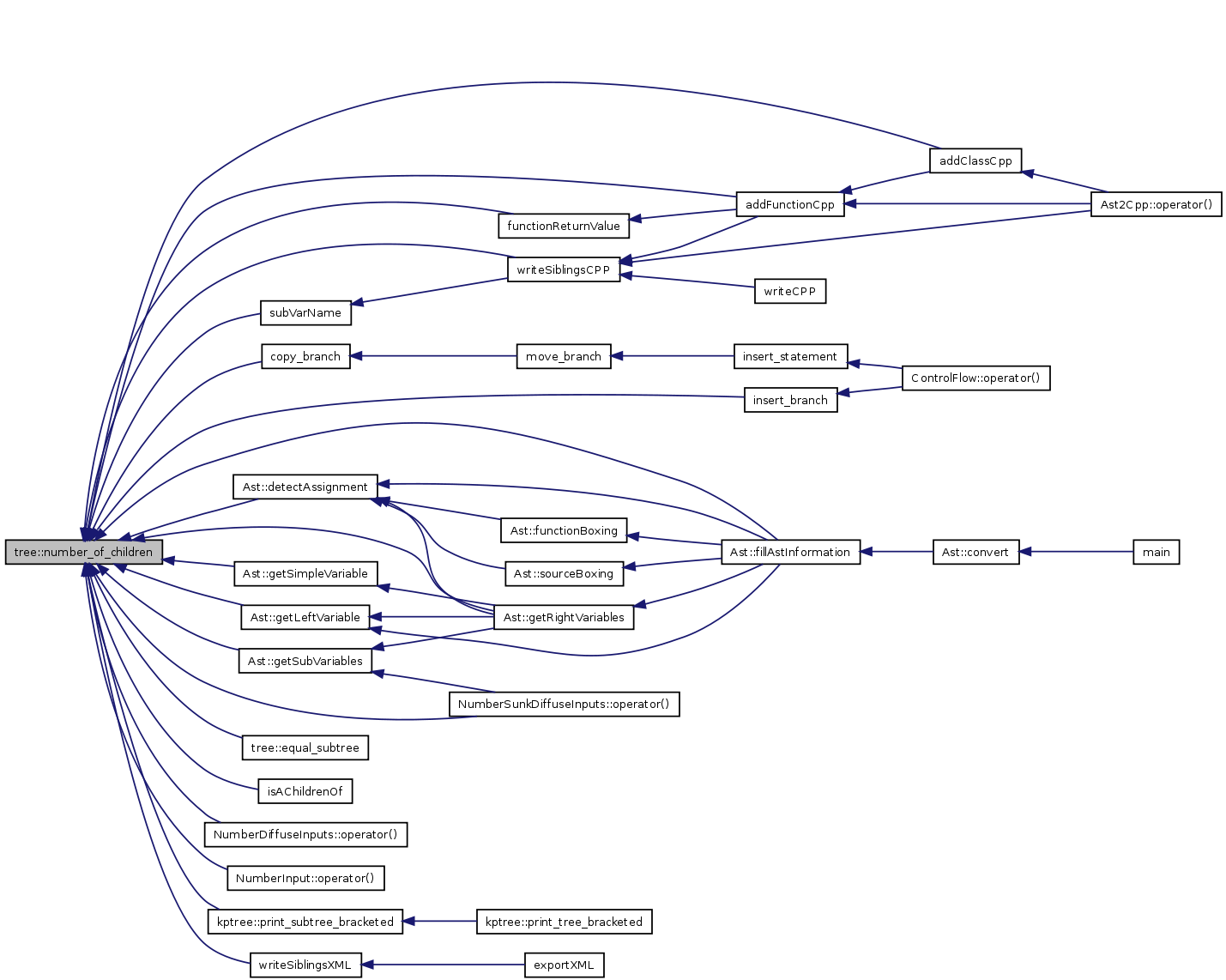
| unsigned int tree< T, tree_node_allocator >::number_of_siblings | ( | const iterator_base & | it | ) | const [inline] |
Count the number of 'next' siblings of node at iterator.
Definition at line 1651 of file tree.h.
References tree< T, tree_node_allocator >::feet, tree< T, tree_node_allocator >::head, tree_node_< T >::next_sibling, and tree_node_< T >::prev_sibling.
Referenced by kptree::print_tree_bracketed().
01652 { 01653 tree_node *pos=it.node; 01654 unsigned int ret=0; 01655 // count forward 01656 while(pos->next_sibling && 01657 pos->next_sibling!=head && 01658 pos->next_sibling!=feet) { 01659 ++ret; 01660 pos=pos->next_sibling; 01661 } 01662 // count backward 01663 pos=it.node; 01664 while(pos->prev_sibling && 01665 pos->prev_sibling!=head && 01666 pos->prev_sibling!=feet) { 01667 ++ret; 01668 pos=pos->prev_sibling; 01669 } 01670 01671 return ret; 01672 }

| bool tree< T, tree_node_allocator >::is_in_subtree | ( | const iterator_base & | position, | |
| const iterator_base & | begin, | |||
| const iterator_base & | end | |||
| ) | const [inline] |
Determine whether node at position is in the subtrees with root in the range.
Definition at line 1743 of file tree.h.
01745 { 01746 // FIXME: this should be optimised. 01747 pre_order_iterator tmp=begin; 01748 while(tmp!=end) { 01749 if(tmp==it) return true; 01750 ++tmp; 01751 } 01752 return false; 01753 }
| bool tree< T, tree_node_allocator >::is_valid | ( | const iterator_base & | it | ) | const [inline] |
Determine whether the iterator is an 'end' iterator and thus not actually pointing to a node.
Definition at line 1756 of file tree.h.
References tree< T, tree_node_allocator >::feet, and tree< T, tree_node_allocator >::head.
Referenced by tree< T, tree_node_allocator >::equal().
01757 { 01758 if(it.node==0 || it.node==feet || it.node==head) return false; 01759 else return true; 01760 }

| unsigned int tree< T, tree_node_allocator >::index | ( | sibling_iterator | it | ) | const [inline] |
Determine the index of a node in the range of siblings to which it belongs.
Definition at line 1763 of file tree.h.
References tree< T, tree_node_allocator >::head, tree< T, tree_node_allocator >::iterator_base::node, tree_node_< T >::parent, and tree_node_< T >::prev_sibling.
01764 { 01765 unsigned int ind=0; 01766 if(it.node->parent==0) { 01767 while(it.node->prev_sibling!=head) { 01768 it.node=it.node->prev_sibling; 01769 ++ind; 01770 } 01771 } 01772 else { 01773 while(it.node->prev_sibling!=0) { 01774 it.node=it.node->prev_sibling; 01775 ++ind; 01776 } 01777 } 01778 return ind; 01779 }
| tree< T, tree_node_allocator >::sibling_iterator tree< T, tree_node_allocator >::child | ( | const iterator_base & | position, | |
| unsigned int | num | |||
| ) | const [inline] |
Inverse of 'index': return the n-th child of the node at position.
Definition at line 1783 of file tree.h.
References tree_node_< T >::next_sibling.
Referenced by addClassCpp(), addFunctionCpp(), Ast::detectAssignment(), Ast::fillAstInformation(), forward(), Ast::getLeftVariable(), Ast::getRightVariables(), Ast::getSimpleVariable(), Ast::getSubVariables(), insert_statement(), isAChildrenOf(), ControlFlow::operator()(), NumberSunkDiffuseInputs::operator()(), subVarName(), and writeSiblingsCPP().
01784 { 01785 tree_node *tmp=it.node->first_child; 01786 while(num--) { 01787 assert(tmp!=0); 01788 tmp=tmp->next_sibling; 01789 } 01790 return tmp; 01791 }
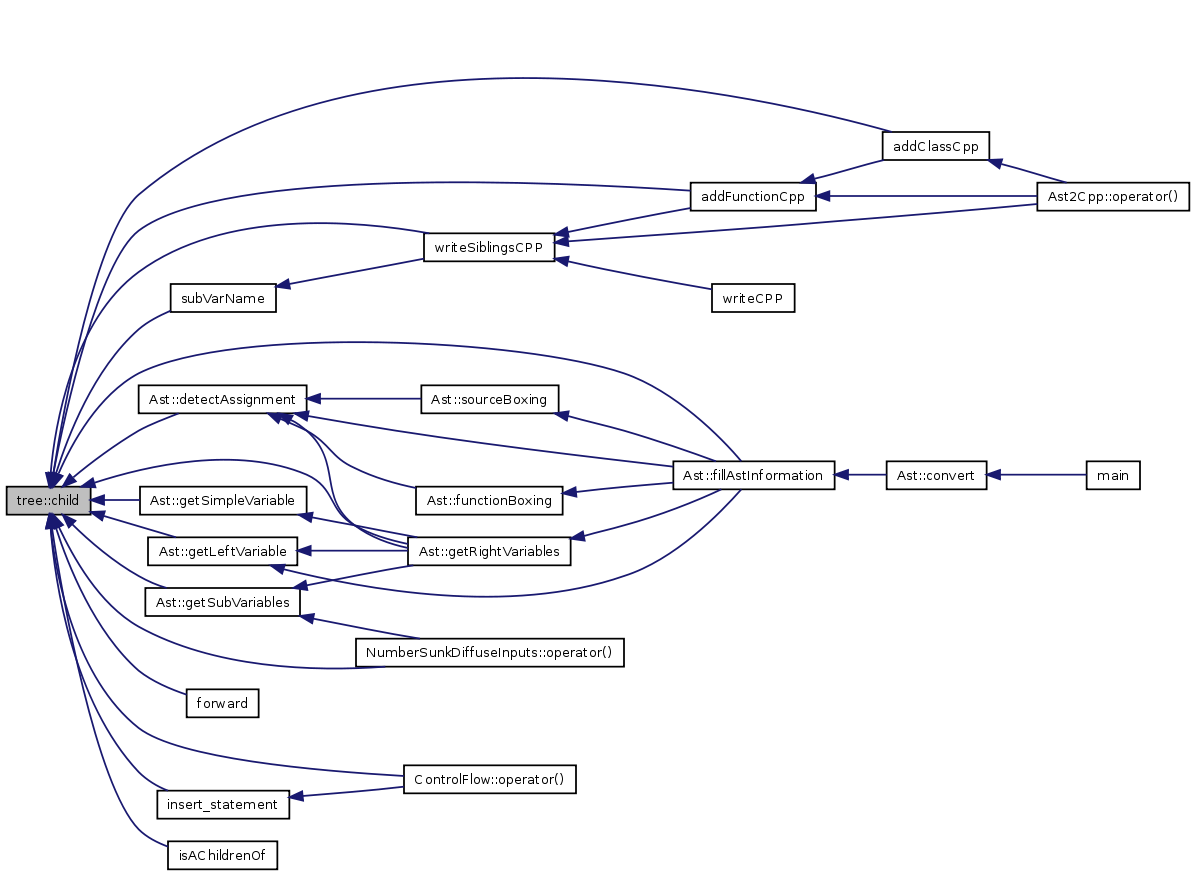
| void tree< T, tree_node_allocator >::head_initialise_ | ( | ) | [inline, private] |
Definition at line 529 of file tree.h.
References tree< T, tree_node_allocator >::alloc_, tree< T, tree_node_allocator >::feet, tree_node_< T >::first_child, tree< T, tree_node_allocator >::head, tree_node_< T >::last_child, tree_node_< T >::next_sibling, tree_node_< T >::parent, and tree_node_< T >::prev_sibling.
Referenced by tree< T, tree_node_allocator >::tree().
00530 { 00531 head = alloc_.allocate(1,0); // MSVC does not have default second argument 00532 feet = alloc_.allocate(1,0); 00533 00534 head->parent=0; 00535 head->first_child=0; 00536 head->last_child=0; 00537 head->prev_sibling=0; //head; 00538 head->next_sibling=feet; //head; 00539 00540 feet->parent=0; 00541 feet->first_child=0; 00542 feet->last_child=0; 00543 feet->prev_sibling=head; 00544 feet->next_sibling=0; 00545 }

| void tree< T, tree_node_allocator >::copy_ | ( | const tree< T, tree_node_allocator > & | other | ) | [inline, private] |
Definition at line 561 of file tree.h.
References tree< T, tree_node_allocator >::begin(), tree< T, tree_node_allocator >::clear(), tree< T, tree_node_allocator >::end(), tree< T, tree_node_allocator >::insert(), tree< T, tree_node_allocator >::replace(), and tree< T, tree_node_allocator >::iterator_base::skip_children().
Referenced by tree< T, tree_node_allocator >::operator=(), and tree< T, tree_node_allocator >::tree().
00562 { 00563 clear(); 00564 pre_order_iterator it=other.begin(), to=begin(); 00565 while(it!=other.end()) { 00566 to=insert(to, (*it)); 00567 it.skip_children(); 00568 ++it; 00569 } 00570 to=begin(); 00571 it=other.begin(); 00572 while(it!=other.end()) { 00573 to=replace(to, it); 00574 to.skip_children(); 00575 it.skip_children(); 00576 ++to; 00577 ++it; 00578 } 00579 }


| tree_node* tree< T, tree_node_allocator >::head |
Definition at line 435 of file tree.h.
Referenced by tree< T, tree_node_allocator >::append_child(), tree< T, tree_node_allocator >::append_children(), tree< T, tree_node_allocator >::begin(), tree< T, tree_node_allocator >::begin_breadth_first(), tree< T, tree_node_allocator >::begin_leaf(), tree< T, tree_node_allocator >::begin_post(), tree< T, tree_node_allocator >::clear(), tree< T, tree_node_allocator >::erase(), tree< T, tree_node_allocator >::head_initialise_(), tree< T, tree_node_allocator >::index(), tree< T, tree_node_allocator >::is_valid(), tree< T, tree_node_allocator >::number_of_siblings(), tree< T, tree_node_allocator >::prepend_child(), tree< T, tree_node_allocator >::prepend_children(), tree< T, tree_node_allocator >::replace(), tree< T, tree_node_allocator >::set_head(), and tree< T, tree_node_allocator >::~tree().
| tree_node * tree< T, tree_node_allocator >::feet |
Definition at line 435 of file tree.h.
Referenced by tree< T, tree_node_allocator >::begin_leaf(), tree< T, tree_node_allocator >::begin_post(), tree< T, tree_node_allocator >::clear(), tree< T, tree_node_allocator >::end(), tree< T, tree_node_allocator >::end_leaf(), tree< T, tree_node_allocator >::end_post(), tree< T, tree_node_allocator >::head_initialise_(), tree< T, tree_node_allocator >::insert(), tree< T, tree_node_allocator >::is_valid(), tree< T, tree_node_allocator >::number_of_siblings(), tree< T, tree_node_allocator >::set_head(), and tree< T, tree_node_allocator >::~tree().
tree_node_allocator tree< T, tree_node_allocator >::alloc_ [private] |
Definition at line 437 of file tree.h.
Referenced by tree< T, tree_node_allocator >::append_child(), tree< T, tree_node_allocator >::erase(), tree< T, tree_node_allocator >::erase_children(), tree< T, tree_node_allocator >::head_initialise_(), tree< T, tree_node_allocator >::insert(), tree< T, tree_node_allocator >::insert_after(), tree< T, tree_node_allocator >::prepend_child(), tree< T, tree_node_allocator >::replace(), and tree< T, tree_node_allocator >::~tree().
 1.5.3
1.5.3